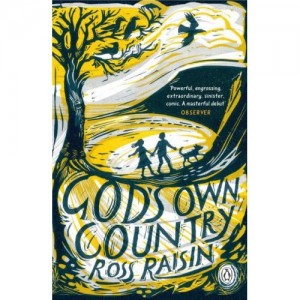Kevin Sampson reviews ‘God’s Own Country‘ by Ross Raisin, one of our favourite books of last year, out now in paperback:

When Ross Raisin burst onto the literary scene with this unusual and strangely compelling debut last year, he was immediately and favourably compared to many a great author. In the popular shorthand of our Twitter-day micro reviewers, God’s Own Country became The Wasp Factory meets A Clockwork Orange; Straw Dogs meets Wuthering Heights. Ross Raisin himself was James Herriot meets Irvine Welsh; the world the book inhabits was Gothic Emmerdale – all of which tended to emphasise the dark undercurrent that gradually builds and perhaps ultimately overwhelms a fine book by a very good new writer. If there’s a criticism of the novel, it’s that the eventual darkness of the story is not as deftly handled as the curt and caustic humour of its opening chapters – but that’s a quibble rather than a caveat.
It’s still a fucking great book. Ross Raisin is 28 and already writes with an assured and individualistic voice. In Sam Marsdyke, he’s created a wonderfully mordant commentator on the world and the times in which we live. Sam is about 19, and lives in the type of farmhouse, high up on the North Yorkshire moors, that’s more Cold Comfort Farm than the toasty-warm aga crofts of The Archers. But it’s a changing landscape – and the Country Life vision of barn-conversion bistros threatens to displace the ancient and venerable (and dying) farm life of generations. Sam is there to observe and record these changes with a vivacious wit and an eye for the absurd. In the early passages of the book he revels in scaring off ramblers with shit-bombs, only to guffaw as they timidly scrabble back into the field they’ve just fled, loudly apologising to the invisible avenging angel for leaving foil on the ground.
He’s not a great-looking lad, Sam – in fact his tormentors, of whom there are many, call him Lankenstein. He’s a classic outsider, always (and quite literally) looking in, peeping through windows, stealing through yards, fields, moors, hen-houses… He fears the wrath of his father and, just like Kes, finds his joy and his freedom wandering the hills and fells with the wind stinging his eyes and a dog in tow. He’s up on one his rocky vantage points when he sees the arrival of the new ‘Towns’ – the incomers from the city who are buying up run-down farmhouses for renovation. He quickly becomes intrigued, then infatuated and latterly obsessed with their sophisticated and sexually-aware 15 year-old, Josephine.
In bygone times, Sam would have been derided as ‘simple’ – his father just calls him a “Nimrod” – and he is heart-breakingly naiive. (The passage where he has Josephine in fits of laughter when he takes Claude Greengrass’s name in vain is tragic. He keeps repeating it, hoping she’ll always laugh as hard – but they never do…) Yet there’s something of Candide about Sam, too – he’s the idiot savant who sees everything for what it is and calls it true. Raisin is at his finest when Sam is engaged in the surreal internal conversations and observations that mark him out as a misunderstood genius. He’ll give a voice to everyone and everything – all creatures great and small. Even seagulls have voices as they prowl too close for comfort, eyeing every mouthful of fish and chips:
“Morning feller? Owt fresh?”
And though he clearly despises the Towns who are turning good, dull, inhospitable pubs that serve zero or shit food into wine bars and brasseries, Sam’s withering wit is best saved for the people who’ve always made his life hell. His parents; his neighbours – and the local kids. Again the onlooker, he just so happens to stumble across a couple a-courting in the back of a car:
“I spied in, watching as he bred her, the car rocking with each shunt. Fucking romantic that, humping on a car seat in the middle of the moor. Hadn’t they beds enough down there they had to come up here and do it in secret? Probably his sister.”
For all it’s minor flaws in the execution, it’s a terrific read, this. Ross Raisin’s language is pungent with ‘ferntickles’ (freckles) and ‘hubbleshoos’ of activity. A flat sea is like a fresh-laid tablecloth. And Sam Marsdyke is just a marvelous and moreish invention. If you’re not already licking your lips and making a note-to-self to lap this up at earliest opportunity, let me give you my own Twitterland text-review. Morven Callar meets My Summer of Love. Boss!